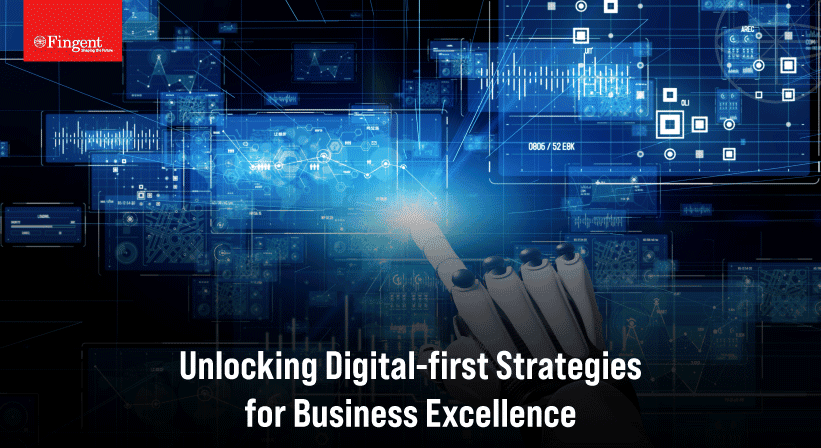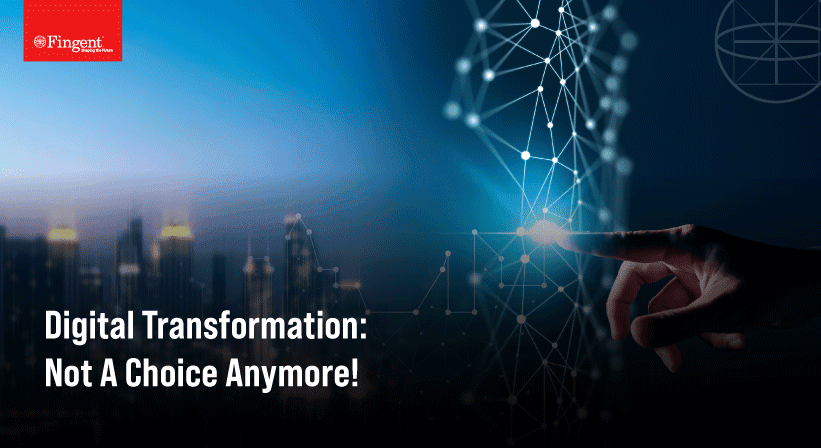ERP or Digital Transformation: The Best Technology Solution For Your Enterprise
Tips To Help You Choose Between ERP & Digital Transformation
If you are a business aiming for delivering value to your customers and willing to accept challenges to integrate technology for a better tomorrow, then Digital Transformation is your Nirvana!
Small to large enterprises, require digital transformation to remain ahead of their competitors. The increasing value offered to your customers and digitally transforming your business goes hand-in-hand. According to IDG, State Of Digital Business Transformation, 89% of businesses have accepted their first business strategy as digital transformation. This includes 95% in Services, 93% in Financial Services, and 92% in Healthcare Services, followed by other industries.
Related Reading: Here’s a guide to help your organization digitize with IoT.
Key Objectives Of Digital Transformation
Digital Transformation is undoubtedly one of the biggest buzzwords of today. Enterprise leaders are looking for strategies to digitally transform their business to leverage the benefits. According to IDC, as per the Worldwide Semiannual Digital Transformation Spending Guide, the worldwide spending on digital transformation, by the year is forecasted to reach $1.97 trillion by the year 2022.
The major objectives of digitally transforming your business include the following:
- Improved Customer Experience
- Increased Operational Workflow And Agility
- Enhancement Of Workforce
- Better Work Culture
- Integration Of Digital Technology
Related Reading: Check out how Artificial Intelligence Revolutionizes Small Businesses.
How Is Digital Transformation Different From ERP Implementation?
ERP or Enterprise Resource Planning software is a suite of applications that can be customized to allow businesses and enterprises to manage their processes.
However, with the Lidl software disaster followed by the National Grid lawsuit, enterprises are skeptical about ERP implementation, to the core. Some people consider ERP implementation as a broader form of Digital Transformation. But, both are different in various ways. Let us walk through the following key differences between the two:
-
Differences In Technology
Core ERP vendors such as Microsoft, SAP, and Oracle rely on technologies that automate back-office functions. On the other hand, digital transformation makes use of a variety of technologies that include ERP, Artificial Intelligence, Internet Of Things, Industry 4.0, to transform their existing business models.
ERP is a typical enterprise application that integrates phases of business operations such as product planning, manufacturing, sales, financials, inventory management, marketing, and human resources within a single MVC architecture, that is, in a single user interface, application, and database.
-
Differences In Business Process Management
ERP systems approach business processes by incremental steps towards business processes for incremental benefits. On the other hand, digital transformation approaches business process improvement by “quantum leaps”. That is, only digital transformation supports a reengineering of business processes.
Business processes can be processed such as customer onboarding, managing insurance claims, etc. The difference lies in the approaches as well. ERP systems take a holistic approach altogether, whereas, on the other hand, digital transformation requires a strategy.
Additionally, ERP systems aim at providing data and functions to deliver products and services more efficiently to customers. On the other hand, digital transformation enhances the way products and services are delivered to customers. Digital transformation additionally changes even the products delivered to the customers.
In a nutshell, ERP implementation is automating the existing business processes, whereas digital transformation involves taking quantum leaps for improving business value. Transforming businesses digitally involves business process re-engineering and optimization. Additionally, digital transformation relies on disruptive changes in existing business processes and are open to new business models and strategies on doing business as well.
-
Differences In Organizational Change Management
Though there are MNCs are adopting technologies such as SAP HANA, Oracle Cloud ERP, or any other ERP implementation, is likely to witness an organizational change management challenge. Organizational change management associated with ERP implementation aims at training people on how to perform the same processes and transactions in a new system.
According to its definition, Enterprise Resource Planning Organizational Change Management (ERP OCM), is a framework to manage the impact of new business processes along with the organizational changes in an enterprise.
However, digital transformations aim at helping the workforce change their job roles to support new business models. Digital transformation makes use of disruptive technology rather than automating the status quo. This is because while ERP systems provide an incremental improvement, digital transformation aims at materially disrupting the existing business model for improvement. This leads to the provision of better products and services to customers.
In a nutshell, Organizational change management in ERP systems aims at addressing the people side of change management in enterprises. It can be also defined as strategies that help stakeholders and employees migrate from their existing state to a new system altogether. On the other hand, digital transformation changes the existing business model with a disruptive technology mechanism.
While ERP implementation focuses on achieving greater efficiency with an enterprise’s existing business model, digital transformation disrupts or changes the existing business model.
-
Differences In Providing Business Value And ROI
A recent HBR survey was conducted for certain companies that invested in digital transformation. This survey that polled 2216 employees illustrated that these companies invested in digital transformation and embraced an annual revenue of $500 million. This figure shows that strategic planning on transforming their businesses digitally resulted in increased revenue and reduced costs.
ERP implementations can deliver a good ROI for enterprises within a few years with all business processes going well. Whereas on the other hand, digital transformation potentially delivers an exponential increase in revenue and considerably reduced costs. This, in turn, leads to enhancements in business value, significant ROI increase, customer loyalty and satisfaction, improved efficiency and other benefits.
-
Differences In Employee Strategies
Enterprise Resource Planning systems focus on getting their employees trained on new systems. This transactional training addresses organizational change management concerns. On the other hand, digital transformation aims at employee acceptance strategies of the new systems. Enterprises adopting digital transformation perform so by making use of comprehensive organizational changes and employee transition methodologies.
ERP systems hardly, invest in organizational change management strategies. This, in turn, leads to high failure rates in enterprises adopting ERP implementation. Whereas on the other hand, digital transformation invests largely on organizational change management strategies. This increases the people side support considerably. This largely explains the success rate and improved ROI as well as the increased business value in enterprises adopting digital transformation strategies.
Related Reading: Check out the Global ERP Technology Trends For 2019.
ERP Implementation or Digital Transformation – Which Is Better For Your Business?
To automate business operations entirely, some enterprises choose a single technology platform. Leveraging on the plethora of technology advancements is the key solution to improving business processes.
A right Risk Mitigation strategy can work wonders in managing your business processes irrespective of which strategy you choose to implement. To this strategy, it is also required that all employees be equally aligned to this strategy as well.
There is no universal or all-purpose solution as to a perfect business strategy implementation. This is where our experts can provide you with the best roadmap for your business. Our experts can guide you with step-by-step guidance for implementing the best technology that suits your enterprise. Call our strategists right away to learn more about which strategy is best to implement for your business!
Stay up to date on what's new

Recommended Posts

20 Dec 2023 B2B
Driving Smart and Sustainable Agriculture with Customized Technology!
As the world grapples with the challenges of climate change, soil degradation, and resource scarcity, agricultural organizations find themselves at a critical juncture. The urgency for adopting sustainable farming practices,……

10 Nov 2023 B2B
Is Your Digital Transformation Initiative Really Working?
To reiterate John F. Kennedy, “Change is the law of life, and those who look only to the past or present are certain to miss the future.” The digital world……

09 Sep 2023 B2B
Digital-First Strategies: A Roadmap to Competitive Advantage
In today's ever-evolving business landscape, the concept of "Digital-First" isn't just a buzzword; it's a strategic necessity. For CIOs, CTOs, and IT Managers, embracing digital transformation isn't just a choice;……

25 Jul 2023 B2B
A Quick Guide To A Successful Digital Transformation Journey!
Today, technology seamlessly weaves its way into every aspect of our daily lives. That's precisely what digital transformation is all about - a process that enables businesses to harness the……
Featured Blogs
Stay up to date on
what's new




















































